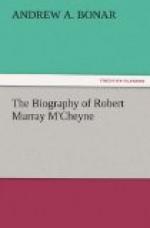His visits to friends were times when he sought to do good to their souls; and never was he satisfied unless he could guide the conversation to bear upon the things of eternity. When he could not do so, he generally remained silent. And yet his demeanor was easy and pleasant to all, exhibiting at once meekness of faith and delicacy of feeling. There was in his character a high refinement that came out in poetry and true politeness; and there was something in his graces that reminded one of his own remark, when explaining the spices of Song 4:16, when he said that “some believers were a garden that had fruit-trees, and so were useful; but we ought also to have spices, and so be attractive.” Wishing to convey his grateful feelings to a fellow-laborer in Dundee, he sent him a Hebrew Bible, with these few lines prefixed:—
Anoint mine eyes,
O
holy dove!
That I may prize
This
book of love.
Unstop mine ear,
Made
deaf by sin,
That I may hear
Thy
voice within.
Break my hard
heart,
Jesus,
my Lord;
In the inmost
part
Hide
thy sweet word.
It was on a similar occasion, in 1838, that he wrote the lines, Thy word is a lamp unto my feet. At another time, sitting under a shady tree, and casting his eye on the hospitable dwelling in which he found a pleasant retreat, his grateful feelings flowed out to his kind friend in the lines that follow:—
“PEACE TO THIS HOUSE.”
Long may peace within this dwelling
Have its resting-place;
Angel shields all harm repelling,—
God, their God of grace.
May the dove-like Spirit guide
them
To the upright land!
May the Saviour-shepherd fed them
From his gentle hand!
Never was there one more beloved as a friend, and seldom any whose death could cause so many to feel as if no other friend could ever occupy his room. Some, too, can say that so much did they learn from his holy walk, “that it is probable a day never passes wherein they have not some advantage from his friendship."[13]




